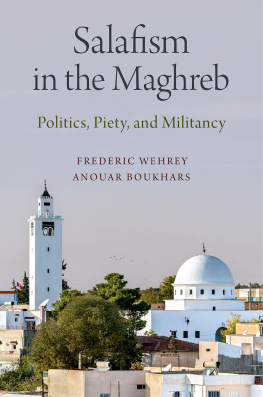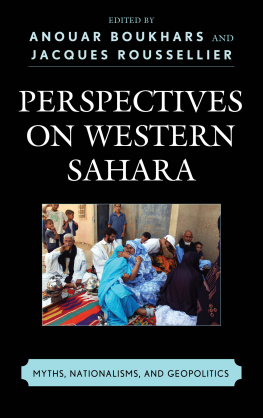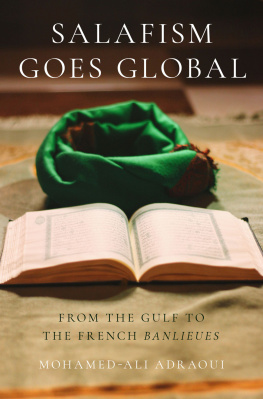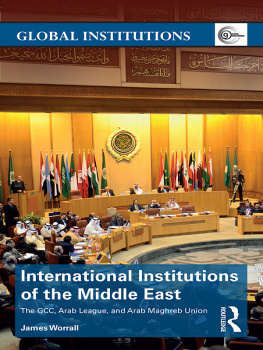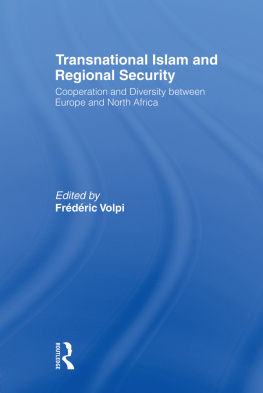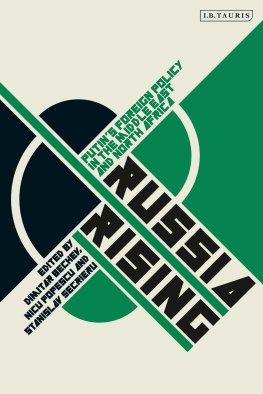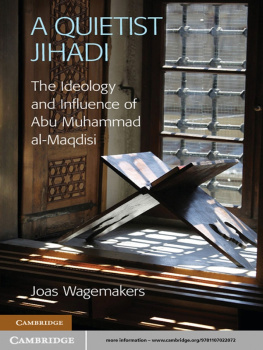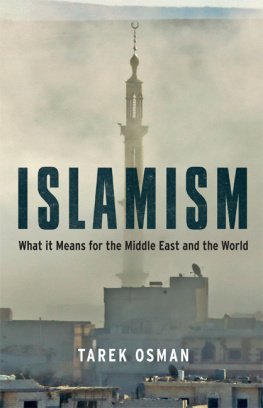Salafism in the Maghreb
Carnegie Endowment for Intl Peace
The Carnegie Endowment for International Peace offers decisionmakers global, independent, and strategic insight and innovative ideas that advance international peace. Founded in 1910 as the first international affairs think tank in the United States, it is a global institution with centers in Beijing, Beirut, Brussels, Moscow, New Delhi, and Washington. Carnegies network works together to provide analysis, shape policy debates, and propose solutions to the most consequential global threats.
The Carnegie Endowment for International Peace does not take institutional positions. Its scholars embody a variety of national and regional outlooks as well as the issues that transcend them. All views expressed in its publications are solely those of the author or authors.

Oxford University Press is a department of the University of Oxford. It furthers the Universitys objective of excellence in research, scholarship, and education by publishing worldwide. Oxford is a registered trade mark of Oxford University Press in the UK and certain other countries.
Published in the United States of America by Oxford University Press
198 Madison Avenue, New York, NY 10016, United States of America.
Oxford University Press 2019
All rights reserved. No part of this publication may be reproduced, stored in a retrieval system, or transmitted, in any form or by any means, without the prior permission in writing of Oxford University Press, or as expressly permitted by law, by license, or under terms agreed with the appropriate reproduction rights organization. Inquiries concerning reproduction outside the scope of the above should be sent to the Rights Department, Oxford University Press, at the address above.
You must not circulate this work in any other form and you must impose this same condition on any acquirer.
CIP data is on file at the Library of Congress
ISBN 9780190942410 (pbk.)
ISBN 9780190942403 (hbk.)
ISBN 9780190942434 (epub.)
Contents
The authors of the book would like to express their deep thanks to the many people who helped during the research and writing process. First and foremost, we owe much gratitude to the Henry Luce Foundation for its generosity in sponsoring a two-year project on Salafism in the Maghreb. This is the second instance of the Foundations support to the Carnegie Endowment for International Peace and, as in the past, the experience has been immensely rewarding and stimulating. Toby Volkman, Luces Director of Initiatives, has been an enthusiastic advocate, mentor, and constructive critic of our workand a true pleasure to work with. We are also grateful to the Carnegie Endowment for providing a collegial and independent home for the research and in particular Marwan Muasher and Michele Dunne of the Middle East program for their unwavering commitment to deeply researched and people-centered work on the region. Within the Middle East program, we were fortunate to harness the talents of several capable colleagues: junior fellows Katherine Pollock and Anmar Jerjees provided indispensable research assistance, while Blair Scott kept a firm hand on the tiller of day-to-day affairs.
We spent much time in the field delving into the social and political context of Salafism, and we could not have carried out this exploration without the countless individuals in the Maghreb who facilitated our travel, brokered meetings, protected us, and spoke to us candidlysometimes at great risk to themselves. For their safety, many must remain anonymous. Those we can mention include Professor Mohamedou Meyine, whose tireless efforts, hospitality, and warmth made Fred Wehreys research truly memorable. In addition, the entire staff of the Centre dEtudes et de Recherches sur lOuest Saharien (CEROS) providing a welcoming research home.
Both of us are indebted to the scholars and analysts who have shaped our thinking on Salafism and the Maghreb, some of whom gathered together for an incredibly rich and stimulating discussion on Maghrebi Salafism, in the congenial setting of seaside Tunis in the winter of 2018. We wish in particular to thank the following for their penetrating critiques of our chapter drafts: Alex Thurston, Francesco Cavatorta, Stphane Lacroix, Hicham Houdaifa, Mohamed Masbah, Dalia Ghanem Yazbeck, Mohammed M. Hafez, Joas Wagemakers, Amel Boubekeur, Raphael Lefevre, Yezid Sayigh, Geoffrey Howard, Jalel Harchaoui, and Ibrahim Yahaya Ibrahim. At Carnegie, a lunchtime discussion with colleaguesmany of them nonMiddle East specialists in the fields of democratization, governance, and securityhelped us reframe our analysis through a comparative lens. We thank Carnegies senior vice president Tom Carothers for facilitating this exchange.
At Oxford University Press, we extend our thanks to our editor, David McBride, for his interest and enthusiasm for the project and to the Presss stellar team of production editors and marketing professionals.
Lastly, we are both blessed with supportive partners who indulged our absences in the field and frequent preoccupations and, most importantly, have made the journey all the more worthwhile. Anouar Boukhars sends his gratitude to Naima Hachad, and Fred Wehrey his appreciation to Nakisa Karimian.
Sitting at the nexus of three continents, the Maghreb region of North Africa (comprising the Arab states of Mauritania, Morocco, Algeria, Tunisia, and Libya) has, for centuries, been a hub of rich political, economic, and cultural exchange, especially around the Mediterranean basin. But in the last century, the Maghreb has been a minor player on the world stage. Its influence was barely felt during the Cold War, with the exception of the Algerian War of Independence and, perhaps, the international belligerency of Libyan leader Muammar Gaddafi. It remained mostly on the margins of the Arab worlds central dramas like the Arab-Israeli conflict, the Arab rivalry with Iran, the post-9/11 US-led war on terror, and the Iraq War. Its main conflicts over the past decades, the Western Sahara dispute and the bloody Algerian civil war during the 1990s, seemed to have mostly escaped attention from the West, and even the world.
Yet in late 2010 and early 2011 all that changed. The self-immolation of a Tunisian fruit seller triggered protests that toppled the Tunisian regime and spread far across the Arab world. In the Maghreb, the aftershocks of that electrifying episode were felt most strongly in Libya, which saw the overthrow of Gaddafi in October 2011 after an eight-month revolution backed by NATO-led forces. Though initially marked by optimism and successful elections, Libya quickly fragmented into civil war by 2014. The resulting vacuum collapsed the boundaries, which were always more permeable than many had assumed, between the Maghreb, the Sahel, and the Mediterranean.
These are the issues that have grabbed the attention of the media and policymakers. But the Maghreb is being transformed in many other significant and sometimes understudied ways. By raising the demands of its increasingly youthful population, the Arab Spring opened up new forms of contestation. Every country in the Maghreb is facing varying levels of unemployment, economic slowdown, and mounting disenchantment among its citizens, especially those on its rural and urban peripheries.
One result of this upheaval has been the spread of a literalist, revivalist form of Islam known as Salafism. This has taken many forms: Salafi political parties like Hizb al-Nour in Egypt or Islah in Tunisia; militant, antidemocratic groups like Ansar al-Sharia in Tunisia and Libya, and proregime loyalist Salafis, to name but a few. This growing political profile also reflects the Salafis spread in Maghreb society. There is little conclusive, quantitative data about the spread of Salafism, but some polling suggests a general decline in popular support for the regions traditionalist forms of Islam, Maliki jurisprudence and Sufism, despite being promoted by local governments.

